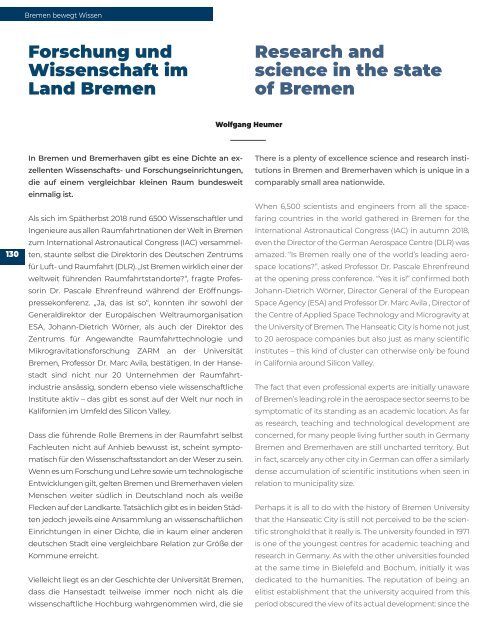Bremen bewegt 2019
Erfolgreiche ePaper selbst erstellen
Machen Sie aus Ihren PDF Publikationen ein blätterbares Flipbook mit unserer einzigartigen Google optimierten e-Paper Software.
<strong>Bremen</strong> <strong>bewegt</strong> Wissen<br />
Forschung und<br />
Wissenschaft im<br />
Land <strong>Bremen</strong><br />
Research and<br />
science in the state<br />
of <strong>Bremen</strong><br />
Wolfgang Heumer<br />
130<br />
In <strong>Bremen</strong> und Bremerhaven gibt es eine Dichte an ex -<br />
zellenten Wissenschafts- und Forschungseinrichtungen,<br />
die auf einem vergleichbar kleinen Raum bundesweit<br />
einmalig ist.<br />
Als sich im Spätherbst 2018 rund 6500 Wissenschaftler und<br />
Ingenieure aus allen Raumfahrtnationen der Welt in <strong>Bremen</strong><br />
zum International Astronautical Congress (IAC) versammelten,<br />
staunte selbst die Direktorin des Deutschen Zentrums<br />
für Luft- und Raumfahrt (DLR). „Ist <strong>Bremen</strong> wirklich einer der<br />
weltweit führenden Raumfahrtstandorte?“, fragte Profes -<br />
sorin Dr. Pascale Ehrenfreund während der Eröffnungs -<br />
pressekonferenz. „Ja, das ist so“, konnten ihr sowohl der<br />
Generaldirektor der Europäischen Weltraumorganisation<br />
ESA, Johann-Dietrich Wörner, als auch der Direktor des<br />
Zentrums für Angewandte Raumfahrttechnologie und<br />
Mikrogravitationsforschung ZARM an der Universität<br />
<strong>Bremen</strong>, Professor Dr. Marc Avila, bestätigen. In der Hansestadt<br />
sind nicht nur 20 Unternehmen der Raumfahrt -<br />
industrie ansässig, sondern ebenso viele wissenschaftliche<br />
Institute aktiv – das gibt es sonst auf der Welt nur noch in<br />
Kalifornien im Umfeld des Silicon Valley.<br />
Dass die führende Rolle <strong>Bremen</strong>s in der Raumfahrt selbst<br />
Fachleuten nicht auf Anhieb bewusst ist, scheint sympto -<br />
matisch für den Wissenschaftsstandort an der Weser zu sein.<br />
Wenn es um Forschung und Lehre sowie um technologische<br />
Entwicklungen gilt, gelten <strong>Bremen</strong> und Bremerhaven vielen<br />
Menschen weiter südlich in Deutschland noch als weiße<br />
Flecken auf der Landkarte. Tatsächlich gibt es in beiden Städten<br />
jedoch jeweils eine Ansammlung an wissenschaftlichen<br />
Einrichtungen in einer Dichte, die in kaum einer anderen<br />
deutschen Stadt eine vergleichbare Relation zur Größe der<br />
Kommune erreicht.<br />
Vielleicht liegt es an der Geschichte der Universität <strong>Bremen</strong>,<br />
dass die Hansestadt teilweise immer noch nicht als die<br />
wissenschaftliche Hochburg wahrgenommen wird, die sie<br />
There is a plenty of excellence science and research institutions<br />
in <strong>Bremen</strong> and Bremerhaven which is unique in a<br />
comparably small area nationwide.<br />
When 6,500 scientists and engineers from all the spacefaring<br />
countries in the world gathered in <strong>Bremen</strong> for the<br />
International Astronautical Congress (IAC) in autumn 2018,<br />
even the Director of the German Aerospace Centre (DLR) was<br />
amazed. “Is <strong>Bremen</strong> really one of the world’s leading aerospace<br />
locations?”, asked Professor Dr. Pascale Ehrenfreund<br />
at the opening press conference. “Yes it is!” confirmed both<br />
Johann-Dietrich Wörner, Director General of the European<br />
Space Agency (ESA) and Professor Dr. Marc Avila , Director of<br />
the Centre of Applied Space Technology and Microgravity at<br />
the University of <strong>Bremen</strong>. The Hanseatic City is home not just<br />
to 20 aerospace companies but also just as many scientific<br />
institutes – this kind of cluster can otherwise only be found<br />
in California around Silicon Valley.<br />
The fact that even professional experts are initially unaware<br />
of <strong>Bremen</strong>’s leading role in the aerospace sector seems to be<br />
symptomatic of its standing as an academic location. As far<br />
as research, teaching and technological development are<br />
concerned, for many people living further south in Germany<br />
<strong>Bremen</strong> and Bremerhaven are still uncharted territory. But<br />
in fact, scarcely any other city in German can offer a similarly<br />
dense accumulation of scientific institutions when seen in<br />
relation to municipality size.<br />
Perhaps it is all to do with the history of <strong>Bremen</strong> University<br />
that the Hanseatic City is still not perceived to be the scien -<br />
tific stronghold that it really is. The university founded in 1971<br />
is one of the youngest centres for academic teaching and<br />
research in Germany. As with the other universities founded<br />
at the same time in Bielefeld and Bochum, initially it was<br />
dedicated to the humanities. The reputation of being an<br />
elitist establishment that the university acquired from this<br />
period obscured the view of its actual development: since the


















